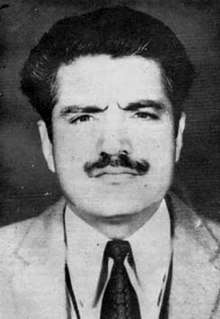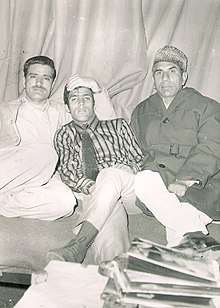Maqbool Bhat
Muhammad Maqbool Bhat also spelt Maqbool Butt (18 February 1938 – 11 February 1984) was a Kashmiri separatist and founder of the separatist organisation National Liberation Front.[2] He was hanged on 11 February 1984 in Tihar Jail in New Delhi.
Maqbool Bhat | |
|---|---|
 | |
| Born | 18 February 1938 |
| Died | 11 February 1984 (aged 45) |
| Cause of death | Hanging[1] |
| Organization | National Liberation Front |
Biography
He was born on 18 February 1938 to a peasant family in Trehgam village, district Kupwara. His father's name was Ghulam Qadar Bhat. He finished his secondary education from a local government school in Trehgam before being sent away to St Joseph’s Higher Secondary School, Baramulla for higher secondary education after he was caught with his friends while trying to cross the border. He studied BA in History and Political Science at St Joseph’s Higher Secondary School, Baramulla and used to stay at the house of Ghulam Ahmed Bara. He also continued his reading on religion, a practice he had been following since childhood but now under the guidance of Maulana Shah Abdul Wali. It was during those days that he got involved in politics of agitation including rallies and delivering fiery speeches but after the crackdown on Plebiscite Front, he went underground till his results were declared. After getting his results, he and his uncle, Aziz Bhat, crossed to Pakistan with a few friends. In Pakistan, Maqbool studied MA Urdu Literature from Peshawar University, Pakistan, where he shared the classroom with the poets Ahmed Faraz and Ta’aha Khan. Maqbool worked as a teacher in South Kashmir for some time before going to Pakistan which brought him into contact with many Jamaat-e-Islami activists and during his study in Pakistan he worked as an editor for a newspaper called Anjam. Maqbool married Raja Begum in 1961 and had two sons, Showkat Maqbool (1962) and Javaid Maqbool (1964) from her but as she suddenly fell seriously ill, Maqbool married again in 1966 to a school teacher named Zakira Begum who would take care of his house and family. Maqbool Bhat also started a magazine called Khyber Weekly during this time but had to shut it down soon after due to shortage of funds. Maqbool contested the 'Basic Democracy' election initiated by the then president of Azad Kashmir, K. H. Khurshid. Later, he also became Khurshid’s election campaigner before quitting politics after learning how Pakistan was sending militants to Kashmir under Operation Gibraltar in the run-up to 1965 Indo-Pakistani War.
He later joined the Azad Kashmir Plebiscite Front in Pakistan administered Kashmir along with his friends and proposed an armed struggle as an objective of the Plebiscite Front before the working party in a meeting on 12 July 1965 in Mirpur but was turned down. This led to the secret formation of The National Liberation Front (NLF) on 13 August 1965 at the residence of Major Amanullah in Peshawar. NLF’s first group — Maqbool Butt, Tahir Aurangzeb, Amir Ahmed and Kala Khan decided to secretly cross back over to Kashmir on 10 June 1966 and recruit people. They were pinpointed by the security forces after an Informer from Baramulla managed to join their ranks and an encounter took place, Auranzeb and a CID officer Amar Chand were killed. Maqbool along with Kala Khan and Mir Ahmad were arrested and tried in a Srinagar court for killing the officer and crossing the Ceasefire Line illegally. In August 1968, judge Neelkanth Ganjoo awarded the death sentence to Maqbool Butt and Mir Ahmad, and a life sentence to Kala Khan in Amar Chand case. Maqbool Butt denied the charges levelled against him and of being an enemy agent under the Enemy Act says he was not an agent but the enemy himself. On December 8, 1968 at 2:10 am, Butt along with Amir Ahmed and Ghulam Yasin escaped by digging a 38-foot tunnel out of prison and crossed over to Pakistan administered Kashmir where he and his friends were again arrested and tortured at Black Fort, Muzaffarabad for around three months after the Plebiscite Front, NLF and National Students Federation (NSF) activists staged demonstrations in Islamabad.

In the years to come Maqbool Bhat also became an inspiration for the younger generation in AJK, and he started advocating for the armed struggle branding AJK rulers as puppets of Pakistani rulers and mortgaging the freedom of Kashmir for money and government posts without any power or authority. Maqbool Bhat was chosen as the chairman of the Plebiscite Front but many members of the Front were not in the favour of an armed struggle. Bhat still went ahead and announced NLF as its armed wing. This was followed by a Gilgit Baltistan Week in 1970 during which Maqbool Bhat along with Khaliq Ansari and Amanulla Khan went to these areas of Kashmir bared for ‘Azad’ Kashmiri politicians but were thrown out by the Pakistani authorities into forests outside of the state boundaries. However, the campaign for independent Kashmir continued to grow in popularity among Kashmiris on both sides.
In 1971, Bhat was accused of masterminding the hijacking of an Indian Airlines passenger airline to Lahore, Pakistan,[3] as the hijackers declared affiliation with JKLF under the leadership of Bhat. It had 30 passengers. Maqbool, the architect of the hijacking, had no presentable clothes to wear to address the press conference which followed after the plane landed. It was only after his associate Abdul Khaliq took a shirt and a pant from two different persons that Bhat could appear before the cameras to demand the release of around 25 NLF prisoners in Indian prisons in exchange for the passengers. Eventually, all passengers and crew were sent back to India while the empty aircraft was blown up. This hijacking would give India an opportunity to disallow any flights from Pakistan over its territory, which hampered the plans of Yahya Khan in sending troops by air to East Pakistan where a rebellion had already been going on. Maqbool Bhat, his friends and every other member of their organisations was arrested and interrogated at Shahee Qila Lahore and ‘Dulahee Camp’ Muzaffarabad but everybody except Hashim Qureshi was rereleased after two years. After the trial, NLF’s membership fell due to the torture faced by its members and Islamabad’s blanket ban on Independent Kashmir activism. But Maqbool Butt was not to relent and decided to cross into Indian administered Kashmir once again but was captured in 1976 in an attempt to rob a bank.
His earlier death sentence was still valid, while he petitioned to the President of India Giyani Zail Singh for clemency on the grounds of an unfair trial. On 3 February 1984, Ravindra Mhatre an Indian diplomat in the UK, was kidnapped in Birmingham, England, and a demand to release Maqbool Bhat was put forward by the kidnappers. On 6 February 1984, members of Kashmir Liberation Army murdered the diplomat in Birmingham and were never heard from again. In retaliation, Bhat's petition for clemency was rejected, and Bhat was executed in the Tihar Jail in New Delhi on 11 February 1984 and buried in the jail premises.[4]
His brother, Habibullah Bhat disappeared when he had gone to meet Maqbool Bhat at Tihaar Jail. Brothers Ghulam Nabi Bhat (Convener of JKLF) and Manzoor Ahmad Bhat were killed in separate encounters with security forces at Srinagar and Trehgam while Zahoor Bhat keeps getting imprisoned again and again. He also has two sisters.
JKLF
Five years after Bhat’s hanging, the JKLF launched a militant movement for separation of the state Jammu and Kashmir from India. Since his death, the JKLF has been demanding that the mortal remains of the party's founder, which were buried inside the Tihar Jail, be handed over. Separatist leaders also call for shutdown each year, which is observed in the Valley to mark his anniversary of death .[5] JKLF announced a ceasefire in 1994.[6]
On 4 November 1989, JKLF militants shot dead judge Neelkanth Ganjoo, who had presided over the Amar Chand murder trial, and declared sentence of death on Maqbool Bhat.[7]
Death
In its judgement, delivered on 6 August 1982, the Court observed that in view of the mercy petition pending before the President, Bhat cannot be classed as one 'under sentence of death' and therefore cannot be confined apart from other prisoners. The Court held that his transfer to the death cell on 27 April 1981, is -"arbitrary and illegal". Consequently, Bhat was shifted to Ward l - originally earmarked for "high security risk prisoners".
Several attempts were made by different Kashmiri groups for the release of Maqbool Bhat, including the hijacking of an Indian plane by Abdul Hameed Diwani in 1976 and an unsuccessful attempt to blow up the Delhi conference hall of Non Alignment Movement in 1981. In the first week of February 1984, an unknown group ‘Kashmir Liberation Army’ kidnapped an Indian diplomat Ravindra Mhatre from India's consulate Birmingham. They demanded the release of Maqbool Bhat from the Indian government but killed him just two days after abduction. Within a week, the Indian government also hanged Maqbool Bhat, who was waiting for the review petition against his sentence on the grounds that the case had several legal flaws from its very beginning in 1966. Several Kashmiri lawyers claim that the action of the Indira Gandhi government ignored Indian law and argue that Maqbool Butt’s hanging was an act of illegal execution by the Indian state. No member of his family was allowed to see him before execution, and his body was not handed over to his family after his death.
See also
References
- "The long, deadly trek to Sunjuwan". The Hindu. 14 February 2018. Retrieved 23 February 2018.
- Mushtaq, Sheikh (11 February 2011). "Kashmir seeks return of hanged separatist leader's remains". Reuters. Retrieved 9 February 2013.
- "The Rediff Interview/Jammu and Kashmir Democratic Liberation Front Chief Hashim Qureshi". Rediff.com. 14 February 2001.
- "After 7 Years, India Hangs Kashmir Nationalist". Los Angeles Times. 12 February 1984.
- "Shutdown on JKLF founder's death anniversary". Zee News. 11 February 2012. Retrieved 9 February 2013.
- "JKLF wants all cases against its cadres withdrawn". The Times Of India. 16 January 2013.
- http://archive.asianage.com/columnists/media-fai-ride-933
External links
- Handoo, Bilal (11 February 2018). "What fuelled Kashmir's Maqbool Butt". Free Press Kashmir.
- "Pakistan Moves to Block March By Supporters of a Free Kashmir". The New York Times. 11 February 1992.
- Maqbool Butt Foundation